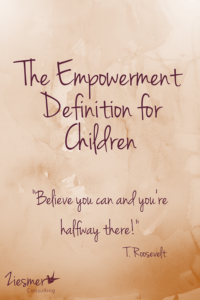The empowerment definition, is there such a thing when working with young children? According to Webster’s dictionary the definition of empowerment is the granting of power or authority or the right to perform various acts or duties. The question is what does this look like for young children? Is it possible to grant them authority and still be the adult, the teacher, the role model? What does it look like to empower ALL kids, regardless of race, ethnicity, social status ability or gender? What does it look like to empower infants?
Let’s unpack this a bit- Children naturally feel as if they have no control over their lives. But, like many adults they passionately seek it. They are constantly fighting for control. Which is why so many power struggles happen between adult caregivers and children. Even infants and toddlers fight for power. They throw tantrums and struggle for independence within the confines of their safety circles.
The Empowerment Definition Examples
Example 1
Maybe you know that babies need eye contact and to be talked to. They need to hear your voice inflections and the way you speak and sound. When you are changing a child’s diaper, try talking to them using a running dialog. Tell them in a matter of fact way exactly what you are doing. Smile as you are doing it and look into their eyes. Let them see and feel from you that their bodily functions such as pooping and peeing are not nasty and gross but just a part of who they are. So often I hear caregivers use phrases like stinky baby or icky poo poo. These are not empowering phrases and only serve as the beginning of body shaming.
So, next time you change a diaper just talk and smile. Say things like “I am going to change your diaper now. It looks like you had a big poop. After we poop we need to make sure we clean our skin well so it doesn’t give us a rash and make us hurt. Do you know everyone poops? I poop too and clean myself when I am done. I know it kind of smells but that’s ok, it means your body is healthy and working properly.”
Being matter of fact and using regular language helps even the youngest babies grow their vocabulary and begin to see that our bodies are part of who we are. Bodily functions, while not always pleasant are nothing we need to be ashamed of. You are empowering children while at the same time promoting their growth and development.
Example 2
Give choices. There is a good way to give choices that will help children feel empowered and they will be less likely to have major meltdowns. At lunchtime you may be tempted to say- “Do you want vegetables with your sandwich?” But instead say “Would you like carrots or broccoli with your sandwich?” This way they feel empowered by choosing what they are going to eat, yet they are still getting their vegetables. This works with other choices too, one thing to remember is to only give them a choice when they REALLY have a choice! If you say “Do you want to go to daycare now?” and they say “no”, are you going to force them to go anyway? Choices give children the sense that they have some control over their life even when they know it is somewhat limited. Helping them to make choices in a safe environment will give them confidence when the s
takes are higher and help them learn to make better choices later on in childhood.
Example 3
This is also the most important one. If you do nothing else, do this. Believe in your child. Let them know you believe in them. Give them the encouragement that allows them to see that they are very competent right now. Whether it is encouraging them to sing because they have great singing voices(or even just know the words) or hanging their beautiful artwork on the wall. These acts send very powerful and empowering messages to even the youngest of children. When children have the support and knowledge that someone they love believes in them, they are more willing to try new things. Children wholeheartedly want to believe their dreams can come true. It is up to the adults in their lives to give them the fuel to make that happen.
To learn more on child development follow us on facebook.
To read more about child development click here








Leave a Reply